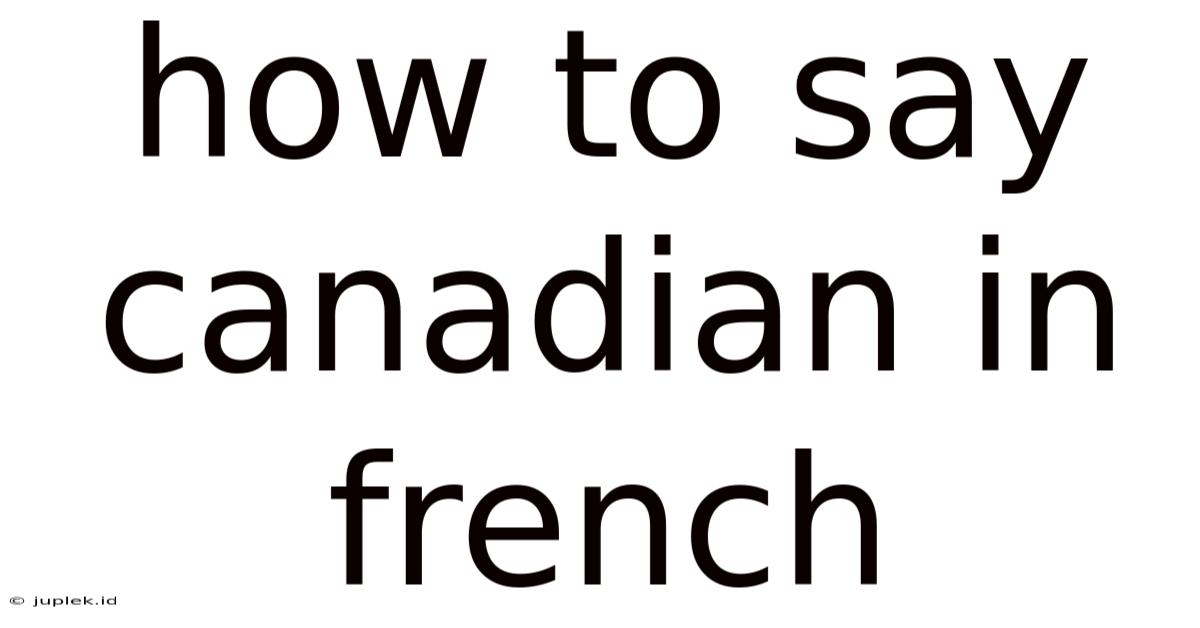How To Say Canadian In French

Discover more detailed and exciting information on our website. Click the link below to start your adventure: Visit Best Website meltwatermedia.ca. Don't miss out!
Table of Contents
How to Say "Canadian" in French: A Deep Dive into Linguistic Nuances
The seemingly simple question, "How do you say 'Canadian' in French?" reveals a fascinating complexity within the linguistic landscape of Canada. There's no single, universally accepted translation, reflecting the country's rich bilingual history and diverse regional variations. This article delves into the various ways to express "Canadian" in French, exploring the nuances, historical context, and preferred usage in different situations.
The Primary Translations: A Starting Point
The most common translations of "Canadian" in French are canadien (masculine) and canadienne (feminine). These are straightforward and widely understood across French-speaking Canada. However, understanding their subtleties is crucial for accurate and appropriate usage.
-
Canadien: Used to describe a male Canadian or something related to a male Canadian. For example, "un homme canadien" (a Canadian man). It can also be used as an adjective, as in "le gouvernement canadien" (the Canadian government).
-
Canadienne: Used to describe a female Canadian or something related to a female Canadian. For example, "une femme canadienne" (a Canadian woman), or "la culture canadienne" (Canadian culture – although grammatically feminine, the reference is not specifically to a female).
These basic translations form the foundation, but the choice often depends on context and desired emphasis.
Beyond the Basics: Exploring Regional Variations and Nuances
While canadien/canadienne are prevalent, regional variations and subtle shifts in meaning add layers of complexity:
-
Quebec's Linguistic Landscape: In Quebec, the most populous French-speaking province, Québécois/Québécoise (Quebecer) often takes precedence when referring specifically to people from Quebec. Using canadien to describe a Quebecer might be perceived as less precise, though it remains perfectly understandable. This reflects a strong sense of regional identity within the broader Canadian context.
-
Acadian French: In Atlantic Canada, particularly New Brunswick, the term Acadien/Acadienne holds significant cultural and historical weight. It refers to descendants of the original French settlers of Acadia (present-day Nova Scotia, New Brunswick, and Prince Edward Island). Using Acadien instead of Canadien acknowledges a distinct historical and cultural heritage.
-
Formal vs. Informal Settings: The choice between canadien/canadienne and regional alternatives often depends on the context. In formal settings, such as official documents or professional communication, canadien/canadienne remains the safest and most widely understood option. Informal conversations, however, might see a preference for more specific regional terms, especially when speaking directly to someone from a particular province.
-
Emphasis on Nationality vs. Culture: The choice of terminology can subtly shift the emphasis between nationality and cultural identity. Using canadien/canadienne highlights nationality, whereas regional terms like Québécois/Québécoise or Acadien/Acadienne emphasize cultural affiliation and historical heritage.
The Political Dimension: Navigating Sensitive Issues
The terminology surrounding "Canadian" in French has also been entangled with political and social issues. The debate over Quebec's sovereignty movement has influenced how Québécois/Québécoise and canadien/canadienne are perceived and used. Some Quebecers might actively choose Québécois to underscore their distinct cultural identity and differentiate themselves from the rest of Canada. Understanding this historical and political context is vital for avoiding unintended misinterpretations.
The Importance of Context: Choosing the Right Word
The best way to say "Canadian" in French is highly contextual. Consider the following when making your choice:
-
Geographic Location: Where is the person or thing from? If it's Quebec, Québécois/Québécoise is often more appropriate. If it's New Brunswick, Acadien/Acadienne might be preferred.
-
Formal vs. Informal Setting: In formal contexts, stick to canadien/canadienne. Informal conversations allow for more flexibility and regional specificity.
-
Intended Emphasis: Do you want to emphasize nationality or cultural identity? The choice of term will subtly reflect this emphasis.
-
Audience: Who are you speaking to? Being sensitive to regional identities and potential political sensitivities is crucial.
Examples in Context:
-
Formal: "Le premier ministre canadien a annoncé une nouvelle politique." (The Canadian prime minister announced a new policy.)
-
Informal (Quebec): "Mon ami, un Québécois formidable, m'a invité à visiter Montréal." (My friend, a wonderful Quebecer, invited me to visit Montreal.)
-
Informal (Atlantic Canada): "J'ai rencontré une Acadienne très accueillante à Moncton." (I met a very welcoming Acadian woman in Moncton.)
Beyond the Individual: Describing Collective Identities
When referring to Canadians as a group, the plural forms are used: Canadiens (masculine plural) and Canadiennes (feminine plural). However, similar considerations of context and regional specificity apply. For instance, referring to the population of Quebec as les Québécois is more precise than les Canadiens.
Conclusion: A Matter of Nuance and Respect
Saying "Canadian" in French is not a simple translation exercise. It involves navigating a complex linguistic landscape shaped by history, regional identities, and political sensitivities. The most appropriate term depends heavily on context, and choosing wisely demonstrates respect for the rich cultural tapestry of French-speaking Canada. By understanding the nuances and appreciating the diverse ways of expressing "Canadian" in French, one can communicate more effectively and accurately, fostering deeper connections and understanding across linguistic and cultural boundaries. The key is always to be mindful of the audience, the setting, and the intended message, and to choose the word that best reflects the specific context and avoids potential misinterpretations.

Thank you for visiting our website wich cover about How To Say Canadian In French. We hope the information provided has been useful to you. Feel free to contact us if you have any questions or need further assistance. See you next time and dont miss to bookmark.
Also read the following articles
| Article Title | Date |
|---|---|
| How To Say Thank You For Coming To Birthday Party | Apr 08, 2025 |
| How To Say Good Evening Japanese | Apr 08, 2025 |
| How To Say Someone Miss You | Apr 08, 2025 |
| How To Say Dance In Georgian | Apr 08, 2025 |
| How To Say Gas Station In Asl | Apr 08, 2025 |
